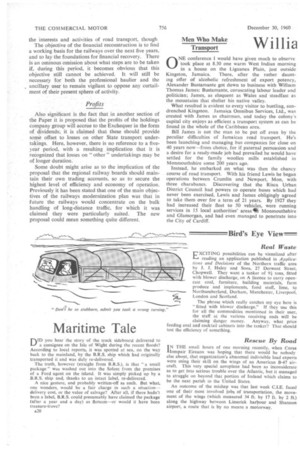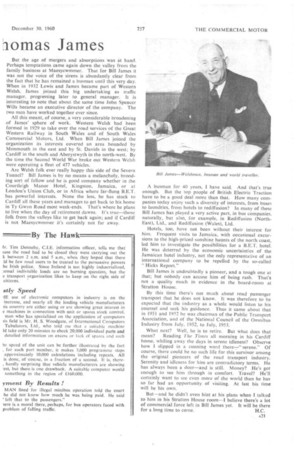Men Who Make Transport
Page 22

Page 23

If you've noticed an error in this article please click here to report it so we can fix it.
Willi
'minas James
0 NE conference I would have given much to observe took place at 8.30 one warm West Indian morning in a house on the Liguanea Plain, just outside Kingston, Jamaica. There, after the rather daunt
ing offer of alcoholic refreshment of export potency, Alexander Bustamante got down to business with William Thomas James: Bustamante, coruscating labour leader and politician; James, as eloquent as Wales and steadfast as the mountains that shelter his native valley.
What resulted is evident to every visitor to bustling, sundrenched Kingston. Jamaica Omnibus Services, Ltd., was created with James as chairman, and today the colony's capital city enjoys as efficient a transport system as can be found in the whole of the Caribbean area.
Bill James is not the man to be put off even by the peculiar difficulties of Jamaican road transport. He's been launching and managing bus companies for close on 40 years now—from choice, for if paternal persuasion and a desire for a ready-made job had prevailed he would have settled for the family woollen mills established in Monmouthshire some 200 years ago, Instead, he embarked on what was then the chancy course of road transport. With his friend Lewis he began operations between Crumlin and Newport, Mon, with three charabancs. Discovering that the Risca Urban District Council had powers to operate buses which had never been exercised, Lewis and James obligingly agreed to take them over for a term of 21 years. By 1927 they had increased their fleet to 50 vehicles, were running
services in 15 local authorities' areas ill Monmouthshire and Glamorgan, and had even managed to penetrate into the City of Cardiff.
But the age of mergers and absorptions was at hand. Perhaps temptations came again down the valley from the family business at Maesycwmmer. That for Bill James it was not the voice of the sirens is abundantly clear from the fact that he has remained a busman until this very day. When in 1932 Lewis and James became part of Western Welsh, James joined this big undertaking as traffic manager, progressing later to general manager. It is interesting to note that about the same time John Spencer Wills became an executive director of the company. The two men have worked together ever since.
All this meant, of course, a very considerable broadening of James' sphere of work. Western Welsh had been formed in 1929 to take over the road services of the Great Western Railway in South Wales and of South Wales Commercial Motors, Ltd. When Bill James joined the organization its interests covered an area bounded by Monmouth in the east and by St. Davids in the west; by Cardiff in the south and Aberystwyth in the north-west. By the time the Second World War broke out Western Welsh were operating a fleet of 477 vehicles.
Are Welsh folk ever really happy this side of the Severn Tunnel? Bill James is by no means a melancholy, brooding sort of fellow and he is good company whether in the Courtleigh Manor Hotel, Kingston, Jamaica, or at London's Union Club, or in Africa where far-flung B.E.T. has powerful interests. None the less, he has stuck to Cardiff all these years and manages to get back to his home in Ty Gwyn Road most week-ends. That's where he plans to live when the day of retirement dawns. It's true—those folk from the valleys like to get back again; and if Cardiff is not Maesycwmmer it's certainly not far away.
A busman for 40 years, I have said. And that's true enough. But the top people of British Electric Traction have to be a good deal more than that. How many companies today enjoy such a diversity of interests, from buses to laundries, from hotels to rediffusion? In many of these Bill James has played a very active part, in bus companies, naturally, but also, for example, in Rediffusion (NorthEast), Ltd., and Rediffusion (Wales), Ltd.
Hotels, too, have not been without their interest for him. Frequent visits to Jamaica, with occasional excursions to the high-priced sunshine haunts of the north coast. led him to investigate the possibilities for a B.E.T. hotel. He was deterred by the economic uncertainties of the Jamaican hotel industry, not the only representative of an international company to be repelled by the so-called " Hicks Report,"
Bill James is undoubtedly a pioneer, and a tough one at that; but nobody can accuse him of being rash. That's not a quality much in evidence in the board-room at Stratton House.
By this time there's not much about road passenger transport that he does not know. It was therefore to be expected that the industry as a whole would listen to his Counsel and seek his guidance, Thus it came about that in 1951 and 1952 he was chairman of the Public Transport Association, and of the National Council of the Omnibus Industry from July, 1952, to July, 1953.
What next? Well, he is to retire. But what does that
mean? Reading The Times all morning in his Cardiff home, whiling away the days in serene idleness? Observe how I slipped in a cunning word there—" serene." Of course, there could be no such life for this survivor among the original pioneers of the road transport industry. Serenity and idleness for him are contradictory terms. He has always been a doer—and is still. Money? He's got enough to see him through in comfort. Travel? He'll certainly want to see even more of The world than he has so far had an opportunity of visiting. At last his time will be his own.
But—and he didn't even hint at his plans when I talked to him in his Stratton House roorrt—I believe there's a lot of commercial force left in Bill James yet. It will be there for a long time to come. H.C.




























































































